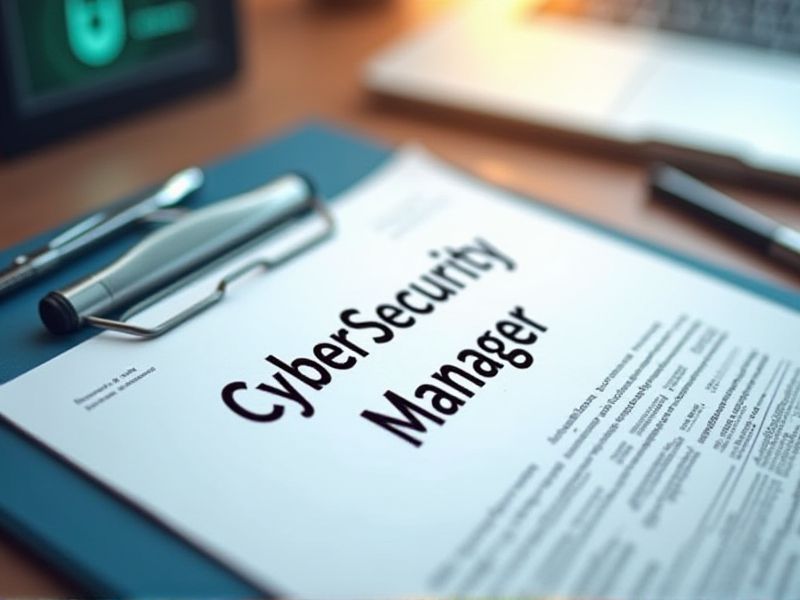
Cyber Security Managers face complex threats that demand specialized skills, making certain certifications essential. These certifications validate an individual's knowledge in areas like risk management, network defense, and incident response. Employers often seek these credentials as proof of expertise and commitment to professional development. Some important certifications for a Cyber Security Manager include CISSP, CISM, and CEH.
Certified Information Systems Security Professional (CISSP)
Organizations need Certified Information Systems Security Professionals (CISSP) to ensure comprehensive understanding of complex cybersecurity frameworks. CISSP certification demonstrates proficiency in identifying and managing risks, a critical skill for effective cybersecurity management. The credibility and rigor of CISSP training ensure that managers are updated on the latest security threats and mitigation strategies. Possessing a CISSP boosts the confidence of stakeholders in the cybersecurity team's ability to protect sensitive information.
Certified Information Security Manager (CISM)
Companies face increasing threats from cyber-attacks, making it crucial for a Cyber Security Manager to hold CISM certification to ensure they are equipped with the latest knowledge and skills. The certification provides a structured understanding of information security governance, enhancing the manager's ability to align security practices with business goals. CISM validates the manager's expertise in risk management, an essential component in proactively identifying and mitigating security threats. Being CISM-certified instills trust and confidence among stakeholders, suggesting the manager is proficient in safeguarding sensitive data and maintaining compliance.
Certified Information Systems Auditor (CISA)
The Certified Information Systems Auditor (CISA) certification equips a Cyber Security Manager with a comprehensive understanding of information systems audit and control, enhancing their ability to identify and mitigate security risks. Having CISA certification indicates proficiency in evaluating IT infrastructures, which is crucial for managing and safeguarding sensitive data. This certification helps ensure that the manager's strategies align with best practices, making them better qualified to protect against and respond to security threats. Holding a CISA also enhances credibility and trust with stakeholders, which is vital for leadership in cybersecurity governance and policy establishment.
Certified in Risk and Information Systems Control (CRISC)
Cybersecurity managers deal with complex risk management and information system controls, and CRISC certification equips them with specialized expertise in identifying and mitigating IT risks. This credential demonstrates proficiency in developing control strategies, ensuring alignment with organizational risk appetite. With CRISC, managers enhance their ability to implement effective security controls, essential for protecting sensitive information. The certification also elevates a manager's status as a trusted advisor in risk management within the organization.
CompTIA Security+
Having a CompTIA Security+ certification validates foundational knowledge in key security concepts and practices, essential for a Cyber Security Manager. Employers often seek individuals with a robust understanding of security solutions and protocols, which Security+ provides. Mastering the certification ensures familiarity with risk management, a critical skill for developing effective security strategies. Security+ also emphasizes practical scenario-based learning, equipping managers to tackle real-world cyber threats efficiently.
Certified Ethical Hacker (CEH)
Certified Ethical Hackers (CEH) possess the technical skills to identify vulnerabilities in systems, which is critical for a Cyber Security Manager to prevent data breaches. Understanding hacking tactics allows security managers to strategize better defense mechanisms. CEH provides insights into the latest security threats, enabling proactive measures rather than reactive responses. Knowledge from CEH certification helps communicate effectively with technical teams, ensuring comprehensive cybersecurity strategies.
GIAC Security Essentials (GSEC)
The GIAC Security Essentials (GSEC) certification equips a Cyber Security Manager with a comprehensive understanding of network security essentials that are critical for overseeing and maintaining an organization's security posture. Possessing this certification means the manager has proven expertise in areas such as active defense, which is crucial for developing and implementing proactive security measures. The GSEC ensures the manager can effectively understand and respond to both current risks and emerging threats, aligning with best practices and industry standards. Without this foundational knowledge, a Cyber Security Manager may struggle to make informed decisions that protect organizational assets and data from cyber threats.
Certified Cloud Security Professional (CCSP)
A Cyber Security Manager requires a Certified Cloud Security Professional (CCSP) certification because it demonstrates expertise in the latest cloud security architecture, design, and operations. This certification validates the manager's ability to secure sensitive data in cloud environments, which is critical as organizations increasingly rely on cloud services. Being CCSP-certified equips the manager with knowledge of legal and compliance issues relevant to cloud security, minimizing organizational risks. The certification also increases confidence among stakeholders and clients, fostering trust in the organization's cloud-based operations.
Offensive Security Certified Professional (OSCP)
The OSCP certification ensures that a Cyber Security Manager possesses practical, hands-on experience in identifying and exploiting vulnerabilities, which is essential for understanding potential threats. It validates a manager's ability to think like an attacker, enabling them to better anticipate and mitigate risks. The rigorous nature of OSCP equips managers with problem-solving skills critical for incident response. Holding an OSCP increases a manager's credibility in the cybersecurity field, fostering trust among their team and stakeholders.
Cisco Certified CyberOps Associate
The Cisco Certified CyberOps Associate provides foundational knowledge and skills in threat monitoring, detection, and response, which are critical for a Cyber Security Manager to effectively oversee security operations. Mastery of this certification enables better coordination with a security operations center (SOC) team, facilitating an efficient response to potential breaches. By understanding Cisco's security solutions and tools, a manager can implement more robust network defense strategies. Knowledge gained from the certification helps in evaluating and improving incident response protocols, ensuring a proactive approach to cybersecurity threats.
Summary
When you obtain certifications as a Cyber Security Manager, your expertise and credibility in the field are significantly enhanced. This leads to potential career advancements and increased job opportunities due to heightened employer confidence in your capabilities. Certified professionals often experience higher salary prospects and industry recognition. Your mastery of contemporary cyber security practices positions you as an invaluable asset in safeguarding organizational data.
